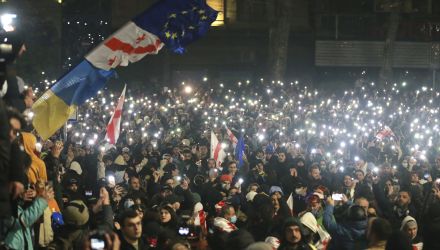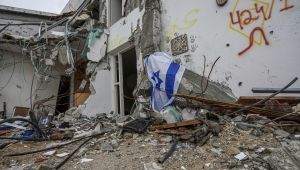Iran's government has used violence, intimidation, and incarceration to keep the country's opposition at bay since the flawed election there last June. Now, the news trickling out of Tehran this week suggests that a more sophisticated ideological effort is underway -- the "soft war" reported in the New York Times. This goes further than closing opposition news outlets and now reportedly includes placing Basij militia instructors in elementary schools, more media controlled by the country's Revolutionary Guard, and expanded surveillance of the Internet.
Iran's leaders claim they are facing nothing less than a Western-directed "color revolution," just as Russia's allies did in Ukraine, where the Orange Revolution of 2004 and 2005 swept the streets with democratic fervor. But the Orange Revolution was a genuine expression of popular anger, not a plot orchestrated from Washington or Brussels. It was however, aided by diplomacy. Western diplomats can draw on experience learned in Kiev to help the "green movement" in Tehran. The United States and particularly Europe should be doing much more to engage and cultivate this newly vocal "other Iran," sustaining its calls for a democratically chosen government.
Despite obvious differences, the Ukraine of the 1990s had some similarities to today's Iran in its nondemocratic character. Athough Ukraine held regular elections during that period, the U.S. NGO Freedom House noted in 2001 that fewer than 25 percent of Ukrainians considered their country a democracy. Reform-minded politicians had been ousted, and civil liberties were trampled.
But the situation began to evolve in 2002. For the first time, Ukrainian voters expressed strong support for the opposition in parliamentary elections, despite irregularities, government tampering, and violence against reformers. Following that, Washington and European governments joined the Ukrainian opposition to apply pressure for fair and independently observed elections. Election-monitoring organizations also helped amplify the message. Diplomacy helped transform the next election into a matter of international, not just domestic, concern. This should be a key goal in Iran.
As part of the Ukraine initiative, Washington helped forge an effective multilateral alliance with the European Union. Ukraine's neighbor, Poland, played a pivotal role, having had its own experience with democratic transition.
So by the time flawed elections occurred again in December 2004, the opposition had lines of communication to the international community. Exit polling cast doubt on the credibility of official voting results. And though change came from within, supplemental pressure from outside played a key role in supporting nonviolent resistance to an unpopular regime whose time had passed.
Of course, Iran is not Ukraine. Unlike the latter, Iran does not belong to a regional organization such as the Organization for Security and Cooperation in Europe or the European Union, nor does it have any desire to join such a grouping. Creative diplomacy can find similar pressure points to apply, nonetheless.
One effective strategy borrowed from the Ukraine experience, for example, would involve foreign heads of state convening round tables of the various domestic parties with foreign mediators. In Ukraine's case, this meant Polish President Aleksander Kwasniewski engaging directly with Ukrainian President Leonid Kuchma and bringing together opposition leader Viktor Yushchenko with Prime Minister Viktor Yanukovych. For Iran, possible candidates might include French President Nicolas Sarkozy launching a round-table discussion with Iranian Supreme Leader Ayatollah Ali Khamenei and candidates from the last election. This is not implausible if it is pursued seriously; Tehran has conducted talks repeatedly with European governments on a number of sensitive issues over the past decade, and this precedent could provide impetus for current talks. Despite its actions against the opposition, Tehran would be hard-pressed to spurn a call from a major European head of government, and the call itself would aid the voices of reform.
European Commission President José Manuel Barroso could meanwhile rally governments represented in Brussels to support a meaningful diplomatic initiative, which includes a discussion of election legitimacy. As Iran's largest trading partner, with some $35 billion in trade last year, the European Union has considerable economic influence over Tehran. European leaders can also seek the involvement of countries like Jordan, Turkey, and the Gulf states in a dialogue with Tehran.
There is one political obstacle in all of this: Conventional wisdom holds that discussing Iranian governance would only complicate ongoing nuclear-related negotiations. But history shows the opposite can be true. Some of the West's greatest strides in arms control with the former Soviet Union, for example, came in the 1980s, when the West was pushing the country hardest on human rights issues.
There is no time to be lost. Even if new elections in Iran are far off, now is the time to begin laying a foundation by preparing for election monitoring and giving the Iranian opposition an open channel to the outside world.
Dobriansky, Paula J.. “Iran's Soft War.” Foreign Policy, November 25, 2009





